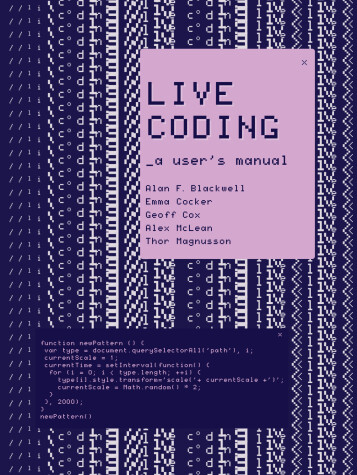Software Studies
2 total works
Speaking Code begins by invoking the "Hello World" convention used by programmers when learning a new language, helping to establish the interplay of text and code that runs through the book. Interweaving the voice of critical writing from the humanities with the tradition of computing and software development, in Speaking Code Geoff Cox formulates an argument that aims to undermine the distinctions between criticism and practice and to emphasize the aesthetic and political implications of software studies. Not reducible to its functional aspects, program code mirrors the instability inherent in the relationship of speech to language; it is only interpretable in the context of its distribution and network of operations. Code is understood as both script and performance, Cox argues, and is in this sense like spoken language -- always ready for action.
Speaking Code examines the expressive and performative aspects of programming; alternatives to mainstream development, from performances of the live-coding scene to the organizational forms of peer production; the democratic promise of social media and their actual role in suppressing political expression; and the market's emptying out of possibilities for free expression in the public realm. Cox defends language against its invasion by economics, arguing that speech continues to underscore the human condition, however paradoxical this may seem in an era of pervasive computing.
Speaking Code examines the expressive and performative aspects of programming; alternatives to mainstream development, from performances of the live-coding scene to the organizational forms of peer production; the democratic promise of social media and their actual role in suppressing political expression; and the market's emptying out of possibilities for free expression in the public realm. Cox defends language against its invasion by economics, arguing that speech continues to underscore the human condition, however paradoxical this may seem in an era of pervasive computing.
Live Coding
by Alan F. Blackwell, Emma Cocker, Geoff Cox, Alex McLean, and Thor Magnusson
Published 22 November 2022
The first comprehensive introduction to the origins, aspirations, and evolution of live coding.
Performative, improvised, on the fly: live coding is about how people interact with the world and each other via code. In the last few decades, live coding has emerged as a dynamic creative practice gaining attention across cultural and technical fields—from music and the visual arts through to computer science. Live Coding: A User’s Manual is the first comprehensive introduction to the practice, and a broader cultural commentary on the potential for live coding to open up deeper questions about contemporary cultural production and computational culture. This multi-authored book—by artists and musicians, software designers, and researchers—provides a practice-focused account of the origins, aspirations, and evolution of live coding, including expositions from a wide range of live coding practitioners. In a more conceptual register, the authors consider liveness, temporality, and knowledge in relation to live coding, alongside speculating on the practice’s future forms.
Performative, improvised, on the fly: live coding is about how people interact with the world and each other via code. In the last few decades, live coding has emerged as a dynamic creative practice gaining attention across cultural and technical fields—from music and the visual arts through to computer science. Live Coding: A User’s Manual is the first comprehensive introduction to the practice, and a broader cultural commentary on the potential for live coding to open up deeper questions about contemporary cultural production and computational culture. This multi-authored book—by artists and musicians, software designers, and researchers—provides a practice-focused account of the origins, aspirations, and evolution of live coding, including expositions from a wide range of live coding practitioners. In a more conceptual register, the authors consider liveness, temporality, and knowledge in relation to live coding, alongside speculating on the practice’s future forms.

